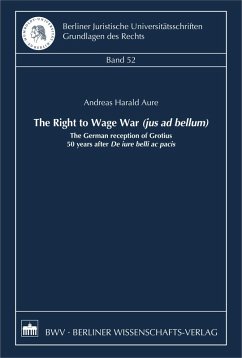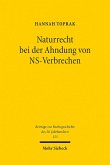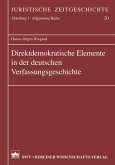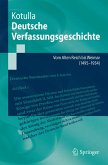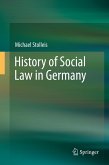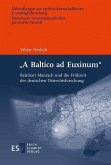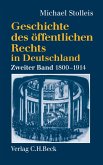With De iure belli ac pacis libri tres (1625), the Dutch humanist and natural law philosopher Hugo Grotius (1583-1645) quickly became the greatest authority on international law (jus gentium) and on just war (bellum justum) in Europe for the next hundred years or so. By examining the theories of three largely unknown German scholars, Konrad Friedlieb, Valentin Alberti and Johann Wolfgang Textor, Andreas Harald Aure discusses dominant visions of international law and the right to go to war (jus ad bellum) in the Protestant parts of the Holy Roman Empire, two generations after Grotius wrote his magnum opus.°°°°The authors struggled with questions such as:°°°°- What may serve as right justification (cause) for war?°°- Can an offensive war be just?°°- Can a war be just on both sides?°°- Has a belligerent the right to pass through third-party territory?°°- Is there a right to wage war on behalf of people in foreign countries?°°°°Two chapters discuss the conceptual development of jus gentium (the law of nations). As an adherent of Thomas Hobbes' systematic approach to law, Samuel Pufendorf (1632-1694) realigned jus gentium as natural law (jus naturale). The main topic of this book is a detailed account of the just conditions for war (jus ad bellum) among leading German scholars in the 17th Century, based on in-depth research of primary sources.°°---------------------------------------------°°Die Veröffentlichung von De iure belli ac pacis libri tres (1625) machte den holländischen Humanisten und Naturrechtsphilosophen Hugo Grotius (1583-1645) innerhalb kurzer Zeit zur führenden Autorität in Europa auf dem Gebiet des Völkerrechts (jus gentium) und des gerechten Krieges (bellum justum), woran sich in den folgenden hundert Jahren nichts ändern sollte.°°Andreas Harald Aure untersucht die Theorien von drei weitgehend unbekannten deutschen Wissenschaftlern, Konrad Friedlieb, Valentin Alberti und Johann Wolfgang Textor, und erörtert auf diese Weise die zwei Generationen nach der Veröffentlichung von Grotius' magnum opus in den protestantischen Teilen des Heiligen Römischen Reichs dominierenden Ansichten zu Völkerrecht und dem Recht zum Krieg (jus ad bellum). °°Diese Autoren befassten sich u. a. mit folgenden Fragen:°°-Was kann als angemessene Rechtfertigung (Grund) für Krieg betrachtet werden?°°-Kann ein Angriffskrieg gerecht sein?°°-Kann ein Krieg auf beiden Seiten gerecht sein?°°-Hat ein kriegführendes Land das Recht, durch Hoheitsgebiete einer dritten Partei zu marschieren?°°-Gibt es ein Recht darauf, im Namen der Bevölkerung fremder Länder Krieg zu führen?°°In zwei Kapiteln wird die Entwicklung des Begriffs jus gentium (das Recht der Völker) erörtert. Als Anhänger von Thomas Hobbes systematischer Rechtsauffassung ordnete Samuel Pufendorf (1632-1694) das jus gentium dem Naturrecht (jus naturale) zu. °°Der Fokus dieses Buchs liegt auf der detaillierten Darstellung der von führenden deutschen Gelehrten des 17. Jahrhunderts vertretenen gerechten Kriegsbedingungen (jus ad bellum), gestützt auf eine umfassende Erforschung der Primärliteratur. °°°°About the author:°°°°Dr. Andreas Harald Aure, born 1970, holds law degrees from the University of Oslo, Cand.jur. 2000, and the Humboldt University in Berlin, LL.M. 2001. He was an associate professor of legal science at the University of Agder (Kristiansand, Norway), 2011-2014. He currently works as a teacher and translator in Oslo.°°
Dieser Download kann aus rechtlichen Gründen nur mit Rechnungsadresse in A, B, BG, CY, CZ, D, DK, EW, E, FIN, F, GR, HR, H, IRL, I, LT, L, LR, M, NL, PL, P, R, S, SLO, SK ausgeliefert werden.

